Family
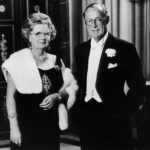 During World War II, a number of royal families considered leaving their countries for a time, due to potential dangers to them and their families. Many of the royals decided that they shouldn’t leave. As for Prince Bernhard, husband of Crown Princess Juliana was serving in the Royal Airforce. It was thought that Princess Juliana, and her daughters would be safer in Canada, so they relocated in in June of 1940. In the years she was there, the couple became pregnant with their third child, who would now be born in Canada, unless something drastically changed.
During World War II, a number of royal families considered leaving their countries for a time, due to potential dangers to them and their families. Many of the royals decided that they shouldn’t leave. As for Prince Bernhard, husband of Crown Princess Juliana was serving in the Royal Airforce. It was thought that Princess Juliana, and her daughters would be safer in Canada, so they relocated in in June of 1940. In the years she was there, the couple became pregnant with their third child, who would now be born in Canada, unless something drastically changed.
With the relocation of the royal family, and now the impending birth, which could, I suppose cause a bit of a problem like the one that exists in the United States, when a child who could later go on to run for president, is born in another country. Our law requires that the child be born on US soil, like a military base or something. Of course, that may not be the law in the Netherlands, but whatever the case may be, the Canadian government was compelled to do something anyway. So, the decision was made that in 1943, the Canadian government temporarily declared a maternity ward of Ottawa Civic Hospital to be extraterritorial. This struck me as funny, because at first glance, I thought it said extraterrestrial!! I thought, “What are they talking about??” Then, I realized that my first glance had been  deceiving. I suppose that is good news for the royal family of the Netherlands, who would not be the parents of an alien from outer space.
deceiving. I suppose that is good news for the royal family of the Netherlands, who would not be the parents of an alien from outer space.
Comedy aside, this change was made because Dutch princess Margriet was to be born at the maternity ward of Ottawa Civic Hospital. With this change, the maternity ward suddenly fell outside of the Canadian domain, causing it to be unaffiliated with any jurisdiction and technically international territory. The purpose was to ensure that the newborn would derive her citizenship from her mother only, thus making her solely Dutch. While this change didn’t matter much since Princess Margriet was a girl, and thereby third in line for the throne. It could have been very important, if the child had been male, and as such, the heir of Princess Juliana. Many countries with a royal family move the sons ahead of any older sisters in the line of succession to the throne. England recently changed that law, meaning that HRH Princess Charlotte (currently 3rd) was not passed by HRH Prince Louis  (currently 4th) in the line of succession there.
(currently 4th) in the line of succession there.
The birth of Princess Margriet came about thusly. “It was the height of the Second World War, things were still not going well for the Allies, when a brief bit of good news came in the midst of darkness. The German forces had already rolled over much of Europe, smashing resistance before them, including the brave but futile defense of Holland. The Dutch Crown Princess Juliana and her two daughters had fled the German invasion and arrived in Canada in June 1940. On January 9, 1943, Dutch Princess Margriet was born at the Ottawa Civic Hospital. Crown Prince Bernhard came from London where he was serving with the Royal Air Force, to be present for the birth. The Royal Family returned to Holland shortly after the war.”
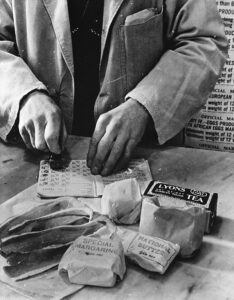
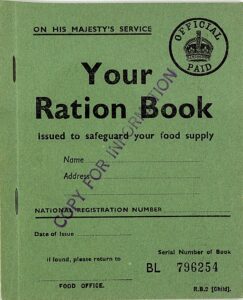 When my dad, Staff Sergeant Allen Spencer, was serving in the Army Air Force during World War II, rationing was not an unusual thing. Nevertheless, most of us think of rationing to be in the form of gas rationing. That is pretty much the kind of rationing we have heard being used these days, but on January 8, 1941, the government of the United Kingdom began a different kind of rationing…food. I can see the value of such a thing, because by limiting the amount of food each person could have, they could ensure that everyone was able to get enough food to sustain them. People weren’t going to gain weight on the amount of food allowed, but they could survive. I suppose the fact that there were so many extra people, in the form of the military forces, just added to the need to ration.
When my dad, Staff Sergeant Allen Spencer, was serving in the Army Air Force during World War II, rationing was not an unusual thing. Nevertheless, most of us think of rationing to be in the form of gas rationing. That is pretty much the kind of rationing we have heard being used these days, but on January 8, 1941, the government of the United Kingdom began a different kind of rationing…food. I can see the value of such a thing, because by limiting the amount of food each person could have, they could ensure that everyone was able to get enough food to sustain them. People weren’t going to gain weight on the amount of food allowed, but they could survive. I suppose the fact that there were so many extra people, in the form of the military forces, just added to the need to ration.
Of course, some food rationing occurred before this date too. Rationing was introduced temporarily by the government of the United Kingdom several times during the 20th century, during and immediately after a war. At the start of World War II in 1939, the United Kingdom was importing 20 million long tons of food per year, including about 70% of its cheese and sugar, almost 80% of its fruit and about 70% of its cereals and fats. It also imported more than half of its meat and relied on imported feed to support its domestic meat production. The civilian population of the country alone, was about 50 million. It was one of the principal strategies of the Germans in the Battle of the Atlantic to attack shipping bound for Britain, restricting British industry and 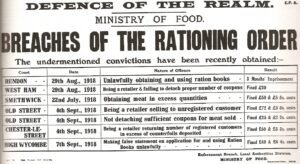 potentially starving nations into submission. Siege tactics were not unusual and have been used throughout history by several countries.
potentially starving nations into submission. Siege tactics were not unusual and have been used throughout history by several countries.
So, to deal with the various forms of shortages, and sometimes extreme shortages, the Ministry of Food instituted a system of rationing. Basically, the Ministry of Food would buy most rationed items, forcing anyone who wanted some of these items to register at chosen shops. Upon registration, they were provided with a ration book containing coupons. The shopkeeper was provided with enough food for registered customers. Purchasers had to present ration books when shopping so that the coupon or coupons could be cancelled as these pertained to rationed items. Rationed items had to be purchased and paid for as usual, although their price was strictly controlled by the government and many essential foodstuffs were subsidized. Basically, rationing restricted what items and what amount could be purchased, as well as what they would cost. To make matters worse the items that were not rationed could be scarce, because the Ministry of Food did not purchase said items. The priced for some of the unrationed items were also controlled by the Ministry of Food, and for many people those prices were too high for them to be able to afford, causing people to try to cheat the system, and merchants to try to either assist the people or to gouge the public in order to make a buck. This brought penalties for 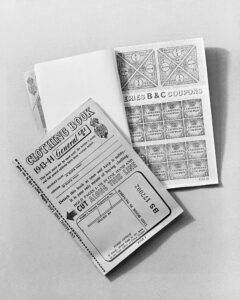
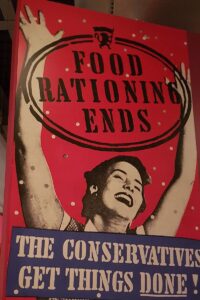 breaking the laws of rationing.
breaking the laws of rationing.
During the World War II, rationing was not restricted to food, and was part of a strategy including controlled prices, subsidies, and government-enforced standards. The goal for this controlled pricing and rationing was to manage scarcity and prioritize the armed forces and essential services with the supplies they needed first. They did still try to make available to everyone, an adequate and affordable supply of goods of acceptable quality. I suppose that how well they accomplished their goal, would be a matter of opinion. Of course, like all wars, World War II ended, as did the rationing of the time, but rationing has returned a number of times, and will again, should the need arise.

 This past year has been such an exciting year for my grandniece, Siara Kirk. Siara got married to her husband Chris on July 23, 2022, and they have been so happy. Still, they knew that their lives needed something more…a family. With that goal in mind, Siara and Chris began planning their future. Things moved along quickly, as you might expect, and by May, they were expecting a sweet baby boy, though they didn’t know it at that time…that news came at the end of June. For any of you who don’t know, Siara lost her son, Alec on January 25, 2020, so this baby is her “Rainbow Baby” and Chris’ first child.
This past year has been such an exciting year for my grandniece, Siara Kirk. Siara got married to her husband Chris on July 23, 2022, and they have been so happy. Still, they knew that their lives needed something more…a family. With that goal in mind, Siara and Chris began planning their future. Things moved along quickly, as you might expect, and by May, they were expecting a sweet baby boy, though they didn’t know it at that time…that news came at the end of June. For any of you who don’t know, Siara lost her son, Alec on January 25, 2020, so this baby is her “Rainbow Baby” and Chris’ first child.
With the addition of their new son, came the need for a bigger place to live, and when the house next door to Siara’s parents, Chantel and Dave Balcerzak, came available, they jumped at the chance. The two couples are more than parents and children, they are best friends too, so the house next door is a great blessing. I’ve always thought that it would be cool to have grandchildren who could just pop in at my house periodically to play. Siara and Chris’ son will have that kind of relationship with his grandparents. I am so excited for all of them to be able to have this kind of special relationship with each other, and with the future grandbabies.

 With the purchase of the house, which gave them lots of room to grow, also came a few projects…mostly painting, but not all painting. Some of the rooms had some wild color choices, so they had to do multiple coats to fully cover them. With Siara being pregnant, she was unable to help in the painting, due to the fumes. So, Siara and her mom worked on simply getting the decorations together. They did a beautiful job. They were, of course, under a bit of a time crunch, because by the time they bought the house in early October, the time until the baby arrives was already getting short. They quickly got to work flipping the house to make it their own, and by the time of the housewarming/baby shower, they were done. It is a beautiful home, and now everything is ready for Baby Kirk to arrive by the 15th of this month. Several of us had hoped for a New Year’s Baby, which would also make it on Siara’s great grandma, Collene Spencer’s birthday, but that was not to be. I
With the purchase of the house, which gave them lots of room to grow, also came a few projects…mostly painting, but not all painting. Some of the rooms had some wild color choices, so they had to do multiple coats to fully cover them. With Siara being pregnant, she was unable to help in the painting, due to the fumes. So, Siara and her mom worked on simply getting the decorations together. They did a beautiful job. They were, of course, under a bit of a time crunch, because by the time they bought the house in early October, the time until the baby arrives was already getting short. They quickly got to work flipping the house to make it their own, and by the time of the housewarming/baby shower, they were done. It is a beautiful home, and now everything is ready for Baby Kirk to arrive by the 15th of this month. Several of us had hoped for a New Year’s Baby, which would also make it on Siara’s great grandma, Collene Spencer’s birthday, but that was not to be. I 
 suppose there is still time for him to come on Siara’s birthday, since she has to have a Caesarian delivery, but again he is going to have to get busy. Either way, he will arrive when he’s ready or on the scheduled date for the Caesarian which ever it happens to be. Baby birthday or not, today is Siara’s 30th birthday. Happy birthday Siara!! Have a great day!! We love you!!
suppose there is still time for him to come on Siara’s birthday, since she has to have a Caesarian delivery, but again he is going to have to get busy. Either way, he will arrive when he’s ready or on the scheduled date for the Caesarian which ever it happens to be. Baby birthday or not, today is Siara’s 30th birthday. Happy birthday Siara!! Have a great day!! We love you!!

 As kids grow up, you suddenly find yourself looking at a whole new person. It’s not just the normal changes that happen as kids grow, like height and a new grown up look about them. Suddenly, they have interests that are very different than yours. Sometimes that could be a bad thing, but for my grandnephew, Ethan Hadlock those new interests are different than many kids his age. Ethan is really into history, and especially World War I. History is often the last thing kids are interested in, but for Ethan, history and especially World War I are the coolest things. He even wanted his friend birthday party to have a World War I theme. His mom, Chelsea Hadlock did a great job creating that for him.
As kids grow up, you suddenly find yourself looking at a whole new person. It’s not just the normal changes that happen as kids grow, like height and a new grown up look about them. Suddenly, they have interests that are very different than yours. Sometimes that could be a bad thing, but for my grandnephew, Ethan Hadlock those new interests are different than many kids his age. Ethan is really into history, and especially World War I. History is often the last thing kids are interested in, but for Ethan, history and especially World War I are the coolest things. He even wanted his friend birthday party to have a World War I theme. His mom, Chelsea Hadlock did a great job creating that for him.
Ethan is the grandson of a retired cop, my brother-in-law, Chris Hadlock and an uncle who is a cop, Jason Sawdon, so security is important to him. With that in mind, Ethan has joined the club Cyber Patriots which teaches kids to check websites and things for cyber security threats. I think that is an amazing club to have. These kinds of threats are a very real part of life these days, and everyone needs to know about it, especially kids. Ethan is also in a welding class right now and he really loves it! That isn’t surprising either, considering his great grandpa, my dad, Allen Spencer was a welder by trade. Christmas brought Ethan a couple of new horizons to try. He was give golf lessons, and he can’t wait to start them and learn the game of golf. He also 
 received a World War I tiger tank Lego set. It is an RC car that he will have to put together. He can’t wait to get going on that. Everyone loves Legos, and Ethan is no exception. He’s really good at Rubik’s cubes too! He can put them right really quickly!!
received a World War I tiger tank Lego set. It is an RC car that he will have to put together. He can’t wait to get going on that. Everyone loves Legos, and Ethan is no exception. He’s really good at Rubik’s cubes too! He can put them right really quickly!!
Ethan loves animals. The Hadlock family is a family of “dog lovers” and Ethan loves all of them. He is always willing to help with the animals, whether it is feeding them, playing with them, or chasing them down when they don’t want to come in the house. Recently, his aunt, Kellie Hadlock hired him to watch her bird. Ethan quickly accepted the job, but really thought it was a volunteer job. When Kellie paid him, he was so thankful that he honestly thanked her every time he saw her for like a week!! It was so sweet! Ethan is no stranger to volunteer work either. Each summer, he volunteers at the Vacation Bible School at his Aunt Lindsay Moore’s church in Laramie! He always works in the recreation area and gets to do things like shoot water rockets!! He always has a blast!! Being the only boy among the cousins, Ethan is always ready to take care of all his cousins too! He watches out for them!
Now that Ethan is 15 years old, he is ready to take his drivers ed test!! He is very excited about learning to drive. He and his mom went to get his study books a while back, and he is ready for the test on Monday. I can’t 
 believe that this sweet boy, who picks on everyone just like his dad, Ryan Hadlock, but is always ready to give a hug to anyone in the family, and even seeks out the family for a hug, is old enough to learn to drive. While it may seem impossible in years, it isn’t surprising in size. Ethan is already well on his way to gaining the height of his dad and grandpa, who are both well over six foot. Ethan is close to six foot now, and with a number of years to grow yet. Today is Ethan’s 15th birthday. Happy birthday Ethan!! Have a great day!! We love you!!
believe that this sweet boy, who picks on everyone just like his dad, Ryan Hadlock, but is always ready to give a hug to anyone in the family, and even seeks out the family for a hug, is old enough to learn to drive. While it may seem impossible in years, it isn’t surprising in size. Ethan is already well on his way to gaining the height of his dad and grandpa, who are both well over six foot. Ethan is close to six foot now, and with a number of years to grow yet. Today is Ethan’s 15th birthday. Happy birthday Ethan!! Have a great day!! We love you!!

 When the FBI began to suspect that they had a mole in the mid-1980s, they assigned the investigation to FBI Agent Robert Philip Hanssen. Hanssen was born April 18, 1944, in Chicago, Illinois, to a Lutheran family that lived in the Norwood Park neighborhood. He was of Norwegian descent. His father, Howard, who died 1993, was a Chicago police officer, and was allegedly emotionally abusive to Hanssen during his childhood. Nevertheless, Hanssen went on to graduate from William Howard Taft High School in 1962 and attended Knox College in Galesburg, Illinois. He graduated with a bachelor’s degree in chemistry in 1966. Hanssen joined the FBI in 1976. Things were going well for him in the FBI, but then, something changed.
When the FBI began to suspect that they had a mole in the mid-1980s, they assigned the investigation to FBI Agent Robert Philip Hanssen. Hanssen was born April 18, 1944, in Chicago, Illinois, to a Lutheran family that lived in the Norwood Park neighborhood. He was of Norwegian descent. His father, Howard, who died 1993, was a Chicago police officer, and was allegedly emotionally abusive to Hanssen during his childhood. Nevertheless, Hanssen went on to graduate from William Howard Taft High School in 1962 and attended Knox College in Galesburg, Illinois. He graduated with a bachelor’s degree in chemistry in 1966. Hanssen joined the FBI in 1976. Things were going well for him in the FBI, but then, something changed.
In 1979, just three years after joining the FBI, Hanssen approached the Soviet Main Intelligence Directorate (GRU) to offer his services. It is thought that he may have had some financial difficulties, and this meeting became the beginning of his first espionage cycle, lasting until 1981. After that, he laid low for a while. Then, in 1981, he restarted his espionage activities and continued until 1991. After that, he ended communications during the collapse of the Soviet Union, because he was afraid that he would be exposed. Hanssen restarted communications the next year and continued until his arrest. Throughout his spying, he remained anonymous to the Russians.
Hanssen spied for Soviet and Russian intelligence services against the United States from 1979 to 2001. His espionage was described by the Department of Justice as “possibly the worst intelligence disaster in US history.” In all, he sold about six thousand classified documents to the KGB that detailed US strategies in the event of nuclear war, developments in military weapons technologies, and aspects of the US counterintelligence program. Hanssen was involved in espionage at the same time as Aldrich Ames in the Central Intelligence Agency (CIA). Both Ames and Hanssen compromised the names of KGB agents working secretly for the United States. Some of those KGB agents were executed for their betrayal. Hanssen also revealed a multimillion-dollar eavesdropping tunnel built by the FBI under the Soviet Embassy. Then in 1994, Ames was arrested. At that time, some of these intelligence breaches remained unsolved, so the search began for another spy. Ironically, they chose the spy himself to search for the spy. How convenient it was for Hanssen. Finally, the FBI paid $7 million to a KGB agent to obtain a file on an anonymous mole. That information led to Janssen’s exposure, when he was identified through fingerprint and voice analysis.
On February 18, 2001, Hanssen was arrested at Foxstone Park, near his home in the Washington DC, suburb of 
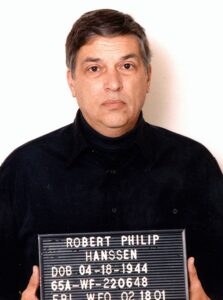 Vienna, Virginia, after leaving a package of classified materials at a dead drop site. Following his arrest, he was charged with selling US intelligence documents to the Soviet Union and subsequently Russia for more than $1.4 million in cash, diamonds, and Rolex watches over a period of twenty-two years. Hanssen pleaded guilty to fourteen counts of espionage and one of conspiracy to commit espionage, to avoid the death penalty. He was sentenced to fifteen life terms without the possibility of parole and was incarcerated at ADX Florence until his death on June 5, 2023.
Vienna, Virginia, after leaving a package of classified materials at a dead drop site. Following his arrest, he was charged with selling US intelligence documents to the Soviet Union and subsequently Russia for more than $1.4 million in cash, diamonds, and Rolex watches over a period of twenty-two years. Hanssen pleaded guilty to fourteen counts of espionage and one of conspiracy to commit espionage, to avoid the death penalty. He was sentenced to fifteen life terms without the possibility of parole and was incarcerated at ADX Florence until his death on June 5, 2023.
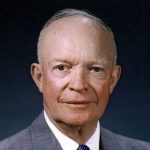
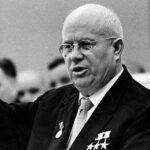 In 1959, President Dwight Eisenhower wanted to convince the Soviet Union that capitalism could greatly benefit the country. If accepted, the Soviet Union would for all intents and purposes become “Americanized” and would probably have been better off. Of course, not everyone agreed with that idea. Nevertheless, Eisenhower, in an effort intended to showcase their ideologies, arranged the “American National Exhibition” in Moscow. To head up the project, they sent Vice President Richard Nixon to attend the opening. What started out as a potentially good idea, quickly took a turn for the worse when Nixon and Soviet leader Khrushchev got into an argument over the topic of capitalism versus communism. Trying to prove someone wrong in their belief system is no easy task, and the conversation quickly got so heated that the vice president of Pepsi intervened and offered the Soviet leader a cup of his delicious, sugary beverage…which he drank…and very much liked.
In 1959, President Dwight Eisenhower wanted to convince the Soviet Union that capitalism could greatly benefit the country. If accepted, the Soviet Union would for all intents and purposes become “Americanized” and would probably have been better off. Of course, not everyone agreed with that idea. Nevertheless, Eisenhower, in an effort intended to showcase their ideologies, arranged the “American National Exhibition” in Moscow. To head up the project, they sent Vice President Richard Nixon to attend the opening. What started out as a potentially good idea, quickly took a turn for the worse when Nixon and Soviet leader Khrushchev got into an argument over the topic of capitalism versus communism. Trying to prove someone wrong in their belief system is no easy task, and the conversation quickly got so heated that the vice president of Pepsi intervened and offered the Soviet leader a cup of his delicious, sugary beverage…which he drank…and very much liked.
Most people who try sodas, like them, and most have a favorite soda that they enjoy whenever they get the opportunity. For Khrushchev and the people of the Soviet Union, this drink was very different from anything they had tasted before, and they were quickly hooked. Years later, the people of the Soviet Union wanted to strike a deal that would bring Pepsi products to their country permanently. The biggest problem, when it came to importing Pepsi to the Soviet Union, was that Soviet money was not accepted throughout the world. They would have to find something they could trade if they wanted to make this deal. So, they cleverly decided to buy Pepsi using a universal currency…vodka!
In the late 1980s, as their initial agreement to serve Pepsi in their country was about to expire, Russia wanted to renew the deal. Unfortunately for them, this time, their vodka wasn’t going to be enough to cover the cost. The question became…what now? They now had to decide just exactly how much they were willing to pay for the addiction that Pepsi really is. In a wild deal, and one that would seem insane to most of us, Russia decided that it was worth giving up a military arsenal big enough to stock a whole country. So, in order to make the 
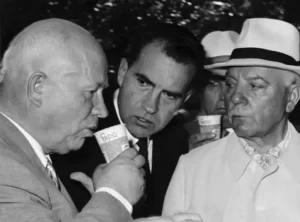 deal, the Russians traded Pepsi a fleet of subs and boats for a whole lot of soda. The new agreement included 17 submarines, a cruiser, a frigate, and a destroyer. Now, that is a whole lot of Pepsi’s worth. In fact, it was three billion dollars’ worth of Pepsi. So, with this historical exchange, Pepsi to become the 6th most powerful military in the world…for a moment anyway. Then, they sold the fleet to a Swedish company for scrap recycling, ending the short-lived military strength of Pepsi. To this day, some people call this a rumor.
deal, the Russians traded Pepsi a fleet of subs and boats for a whole lot of soda. The new agreement included 17 submarines, a cruiser, a frigate, and a destroyer. Now, that is a whole lot of Pepsi’s worth. In fact, it was three billion dollars’ worth of Pepsi. So, with this historical exchange, Pepsi to become the 6th most powerful military in the world…for a moment anyway. Then, they sold the fleet to a Swedish company for scrap recycling, ending the short-lived military strength of Pepsi. To this day, some people call this a rumor.

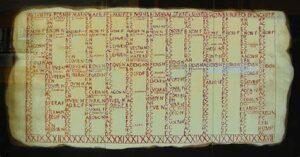 As we move into the new year, we begin to think about how long the year seems…until we look at the year’s end speedily approaching. Then, we realize just how short the year really was, but what if there was a strange “time paradox” that disrupted the “space-time continuum” that we were told about in the movie, Back to the Future? Well, I don’t know if such a “time paradox” could really exist, but in the year 46BC, Julius Caesar did cause a type of disruption in the “space-time continuum” when he decided to revamp the human calendar. Of course, the days went on as usual, but the names of things and the way we looked at them changed. Now, for those of you who hate the whole biannual time change thing…well, this would really blow your body’s natural rhythms out of the water.
As we move into the new year, we begin to think about how long the year seems…until we look at the year’s end speedily approaching. Then, we realize just how short the year really was, but what if there was a strange “time paradox” that disrupted the “space-time continuum” that we were told about in the movie, Back to the Future? Well, I don’t know if such a “time paradox” could really exist, but in the year 46BC, Julius Caesar did cause a type of disruption in the “space-time continuum” when he decided to revamp the human calendar. Of course, the days went on as usual, but the names of things and the way we looked at them changed. Now, for those of you who hate the whole biannual time change thing…well, this would really blow your body’s natural rhythms out of the water.
It seems rather pretty egotistical to just randomly decide that you needed to change up a whole year, and then name the whole thing after yourself to boot, but the Julius Caesar truly thought of himself as a sort of god, I think. It’s not that the pre-Julian Roman calendar didn’t have its problems, because it did, and maybe Caesar thought he was doing a good thing. Still, in the end, the whole maneuver that occurred in the time frame progressing from 46BC to 45BC (note that until Jesus was born, the time was listed as BC, Before Christ and basically went backward. After his birth, time began to go forward, 1AD, 2AD, 3AD, etc. The term anno Domini is Medieval Latin and means “in the year of the Lord” or the year Christ was born.) caused a good bit of confusion…the kind of confusion that would make the time change seem totally insignificant.
The calendar the Romans used were not without fault. The Romans had to periodically add a leap month every few years to keep the calendar year in sync with the solar year. Unfortunately, they had missed a few with the chaos of the civil wars of the late republic. Now if you think the time change is odd, imagine having July suddenly be in the middle of winter in the northern hemisphere. That’s what was happening due to the missed additional leap months that were not happening. The calendar was obviously not well planned. So, to fix things, Caesar chose to take one year, and make a number of drastic changes designed to “get things back on track” once and for all. Nicknamed “the Year of the Consulship of Caesar and Lepidus” or the year of confusion, 46BC had two extra leap months inserted by Julius Caesar. This was in order to make his newly formed Julian Calendar match up with the seasonal year. In the end, 46BC was 445 days long and is the longest year in human history. Julius Caesar added Mercedonius (23 days) and two other intercalary months (33 and 34 days respectively) to the 355-day lunar year, to recalibrate the calendar in preparation for his calendar reform, which went into effect in 45 BC. Of course, the actual planetary orbit-year remained the same. He couldn’t change that. There were still problems with the calendar, but they probably weren’t quite as significant as the old Roman calendar, which required a manual reset of the year periodically.
The Julian Calendar would remain the standard in the western world for over 1600 years, until superseded by the Gregorian Calendar in 1582. The Gregorian calendar that is still widely used today. It is a solar calendar that was first introduced in 1582 by the Catholic Church and replaced the Julian calendar. The Gregorian 
 calendar is used for non-religious administration around the world and has been adopted by 168 countries as their official calendar. The principal change was to space leap years differently so as to make the average calendar year 365.2425 days long. For church functions, the church calendar is in place, and the Jewish people use the Hebrew calendar. I’m sure there are nations that use some other form of calendar, but the Gregorian calendar seems to keep the seasons aligned with the calendar pretty well.
calendar is used for non-religious administration around the world and has been adopted by 168 countries as their official calendar. The principal change was to space leap years differently so as to make the average calendar year 365.2425 days long. For church functions, the church calendar is in place, and the Jewish people use the Hebrew calendar. I’m sure there are nations that use some other form of calendar, but the Gregorian calendar seems to keep the seasons aligned with the calendar pretty well.

 When things started to change for the worse at the hospital where my nephew, Allen Beach and his wife, Gaby worked, they decided to get ahead of the situation. So, they made the move to Eugene, Oregon in search of a better life for themselves. Now, a little over a year later, they are nicely settled, and loving their jobs. Gaby works at the Veteran’s Administration, working in a VA Hospital, while Allen works as a Care Management Associate for Aetna. Allen works with doctors to coordinate care plans that align with Aetna health insurance, which was acquired by CVS a few years ago. Allen works out of his home, which as we all know is a fairly new phenomenon these days, stepped up with the Covic pandemic. Nevertheless, while working from home seemed strange to many of us, it is looked upon as rather a primo kind of job these days, and Allen is totally loving it…and I’m sure their dog, Oly loves it too.
When things started to change for the worse at the hospital where my nephew, Allen Beach and his wife, Gaby worked, they decided to get ahead of the situation. So, they made the move to Eugene, Oregon in search of a better life for themselves. Now, a little over a year later, they are nicely settled, and loving their jobs. Gaby works at the Veteran’s Administration, working in a VA Hospital, while Allen works as a Care Management Associate for Aetna. Allen works with doctors to coordinate care plans that align with Aetna health insurance, which was acquired by CVS a few years ago. Allen works out of his home, which as we all know is a fairly new phenomenon these days, stepped up with the Covic pandemic. Nevertheless, while working from home seemed strange to many of us, it is looked upon as rather a primo kind of job these days, and Allen is totally loving it…and I’m sure their dog, Oly loves it too. 
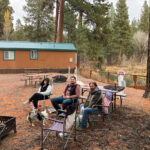
Allen and Gaby like to take walks through a beautiful park they found along the Willamette River, and they try to get out and take Oly for walks as often as they can. Right now, they are renting, but as soon as the housing market settles down, they are planning to buy another house. They loved their house here in Casper, Wyoming, and I’m sure it was hard to go back to renting. Now that they are both settled in jobs, and they know that they like the area, they are ready for take the next step and buy a house again.
My sister, Caryl (Allen’s mom) and her husband, Mike Reed took a trip to visit Allen and Gaby in early November, and they all had a great time. Caryl and Mike took their motorhome, and they took a week to travel along the Oregon Coast. Allen and Gaby had such a great time. They are looking forward to more trips along 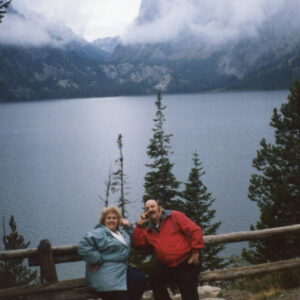
 the coast now that they’ve seen some of the towns with Caryl and Mike. Their trip down the coast included Crater Lake, which was a place our parents, Allen’s grandparents, Allen and Collene Spencer loved to go. I love the picture of Allen and Gaby there. I wish I had known they were there, because I would have had them take a picture like the one his grandparents took. Maybe next time they go there. I’m happy they love their new city, and glad for Caryl and Mike that it isn’t too awfully far away. I’m sure there will be lots of future visits. Today is Allen’s birthday. Happy birthday Allen!! Have a great day!! We love you!!
the coast now that they’ve seen some of the towns with Caryl and Mike. Their trip down the coast included Crater Lake, which was a place our parents, Allen’s grandparents, Allen and Collene Spencer loved to go. I love the picture of Allen and Gaby there. I wish I had known they were there, because I would have had them take a picture like the one his grandparents took. Maybe next time they go there. I’m happy they love their new city, and glad for Caryl and Mike that it isn’t too awfully far away. I’m sure there will be lots of future visits. Today is Allen’s birthday. Happy birthday Allen!! Have a great day!! We love you!!
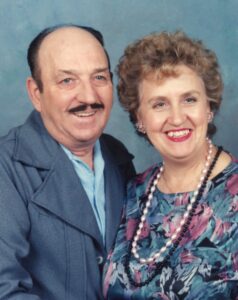
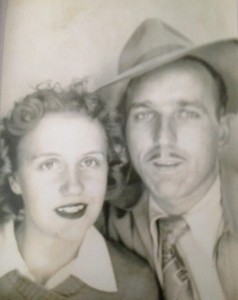 As with my dad, Allen Spencer, the longer my mom, Collene Spencer is in Heaven, the more I miss her. I was actually thinking about her a couple of days ago, not that I don’t think of her every day, but this was on a more specific subject. Mom was such a deeply Christian woman, and she worked very hard to educate herself in God’s ways and in His Word. Now, as I take my own walk in the Lord, I find myself reflecting on all the people my mom influenced to turn their lives over to the Lord. My parents were great spiritual leaders, and while they didn’t travel the world evangelizing, they spoke to those they could, and their good clean lives did the rest. After my mom’s funeral, I was surprised at the people who told me about how my parents’ lives had influenced them. To say the least, I was amazed. My parents, in their own quiet, unassuming way drew many people to the Lord.
As with my dad, Allen Spencer, the longer my mom, Collene Spencer is in Heaven, the more I miss her. I was actually thinking about her a couple of days ago, not that I don’t think of her every day, but this was on a more specific subject. Mom was such a deeply Christian woman, and she worked very hard to educate herself in God’s ways and in His Word. Now, as I take my own walk in the Lord, I find myself reflecting on all the people my mom influenced to turn their lives over to the Lord. My parents were great spiritual leaders, and while they didn’t travel the world evangelizing, they spoke to those they could, and their good clean lives did the rest. After my mom’s funeral, I was surprised at the people who told me about how my parents’ lives had influenced them. To say the least, I was amazed. My parents, in their own quiet, unassuming way drew many people to the Lord.
While my mom’s Christian walk is so important, it is not the only endearing quality my mom possessed. She loved making her daughters smile and would go to great lengths to accomplish her goals. She woke us up each  day with a song…often a silly song. If we didn’t smile, she would sometimes make funny faces or act in a funny way. Mom’s laugh was infectious, and you really couldn’t help but laugh. As I think back of the days of my childhood, I realize more and more, just how blessed I am, and how blessed I was then. Mom taught her daughters the things we would need to be successful in whatever we undertook, but first and foremost, she taught us how to care for a family and a home. We all knew how to cook, and we are all good cooks. Mom came from a long line of really great cooks, and she passed all the knowledge down to us. Like her mom, Hattie Byer, she could make a great meal out of just about anything. Mom was born toward the end of the Great Depression, and the people of that era knew that it was essential to be frugal. She had 8 siblings, and Grandma and Grandpa (George Byer) never turned away a hungry soul. The food just had to stretch, and it did. And it still tasted great, even if there was a little more water, a couple more potatoes, and a little less meat in the stew. Mom learned from the best, and her daughters and our families benefitted.
day with a song…often a silly song. If we didn’t smile, she would sometimes make funny faces or act in a funny way. Mom’s laugh was infectious, and you really couldn’t help but laugh. As I think back of the days of my childhood, I realize more and more, just how blessed I am, and how blessed I was then. Mom taught her daughters the things we would need to be successful in whatever we undertook, but first and foremost, she taught us how to care for a family and a home. We all knew how to cook, and we are all good cooks. Mom came from a long line of really great cooks, and she passed all the knowledge down to us. Like her mom, Hattie Byer, she could make a great meal out of just about anything. Mom was born toward the end of the Great Depression, and the people of that era knew that it was essential to be frugal. She had 8 siblings, and Grandma and Grandpa (George Byer) never turned away a hungry soul. The food just had to stretch, and it did. And it still tasted great, even if there was a little more water, a couple more potatoes, and a little less meat in the stew. Mom learned from the best, and her daughters and our families benefitted.
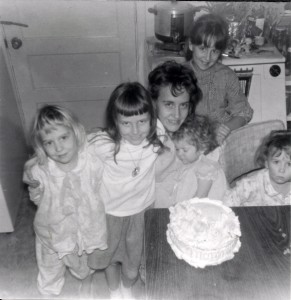
 Mom was such a sweet and loving person, and always tried to do right by all who crossed her path. Mom always tried to walk in love toward her fellow man. She was known to stop and pray for someone who had a need. She was a generous woman who always gave as much as she could. Her giving nature, a reflection on her parents and her loving relationship with our dad, showed in everything she did, and was something she tried to also instill in her daughters. We simply couldn’t have asked for a better mom, or dad. Today would have been Mom’s 88th birthday. Happy birthday in Heaven, Mom. We love and miss you very much, and we look forward to seeing you again when we all go to Heaven.
Mom was such a sweet and loving person, and always tried to do right by all who crossed her path. Mom always tried to walk in love toward her fellow man. She was known to stop and pray for someone who had a need. She was a generous woman who always gave as much as she could. Her giving nature, a reflection on her parents and her loving relationship with our dad, showed in everything she did, and was something she tried to also instill in her daughters. We simply couldn’t have asked for a better mom, or dad. Today would have been Mom’s 88th birthday. Happy birthday in Heaven, Mom. We love and miss you very much, and we look forward to seeing you again when we all go to Heaven.
 Sometimes, there can be a rare phenomenon that happens by chance, but unlike the phenomenon of twins being born on different days, the phenomenon that took place on December 31, 1899, while not totally planned, had to be helped just a little bit. On that night, the last night of the year, the passenger steamer, SS Warrimoo was quietly making its way through the dark waters of the mid Pacific Ocean on its way from Vancouver, Canada to Australia. In the days without GPS, the navigation was calculated by the stars. It was very accurate. That night, the navigator had just finished working out a star fix and brought the results to Captain John DS Phillips. The Warrimoo’s position was LAT 0º 31′ N and LONG 179 30′ W. The date was December 31, 1899. First mate Payton broke in saying, “Know what this means? We’re only a few miles from the intersection of the Equator and the International Date Line.” At first thought many of us would not see the significance of that, but Captain Phillips saw it, and he was just “prankish” enough to take full advantage of the opportunity for achieving the “navigational freak of a lifetime.”
Sometimes, there can be a rare phenomenon that happens by chance, but unlike the phenomenon of twins being born on different days, the phenomenon that took place on December 31, 1899, while not totally planned, had to be helped just a little bit. On that night, the last night of the year, the passenger steamer, SS Warrimoo was quietly making its way through the dark waters of the mid Pacific Ocean on its way from Vancouver, Canada to Australia. In the days without GPS, the navigation was calculated by the stars. It was very accurate. That night, the navigator had just finished working out a star fix and brought the results to Captain John DS Phillips. The Warrimoo’s position was LAT 0º 31′ N and LONG 179 30′ W. The date was December 31, 1899. First mate Payton broke in saying, “Know what this means? We’re only a few miles from the intersection of the Equator and the International Date Line.” At first thought many of us would not see the significance of that, but Captain Phillips saw it, and he was just “prankish” enough to take full advantage of the opportunity for achieving the “navigational freak of a lifetime.”
Phillips called his navigators to the bridge to check and double check the ship’s position. It simply would not do for there to be any miscalculation. He changed course slightly so as to bear directly on his mark. Then, he adjusted the engine speed for perfect timing. The calm weather and clear night worked in his favor. With determined and careful maneuvering, the SS Warrimoo was in perfect position at midnight. The ship now sat on the Equator at exactly the point where it crossed the International Date Line! This seems like a minor thing, but 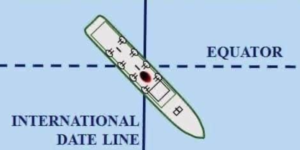 the consequences of this bizarre position were actually many. This put the forward part (bow) of the ship was in the Southern Hemisphere and in the middle of summer; the rear (stern) was in the Northern Hemisphere and in the middle of winter; the date in the aft part of the ship was December 31, 1899; in the bow (forward) part it was January 1, 1900. They had managed to place the ship not only in two different days, two different months, two different years, and two different seasons…but, in two different centuries…all at the same time!! Amazing, and unlikely to ever happen again, unless it was specifically planned.
the consequences of this bizarre position were actually many. This put the forward part (bow) of the ship was in the Southern Hemisphere and in the middle of summer; the rear (stern) was in the Northern Hemisphere and in the middle of winter; the date in the aft part of the ship was December 31, 1899; in the bow (forward) part it was January 1, 1900. They had managed to place the ship not only in two different days, two different months, two different years, and two different seasons…but, in two different centuries…all at the same time!! Amazing, and unlikely to ever happen again, unless it was specifically planned.

